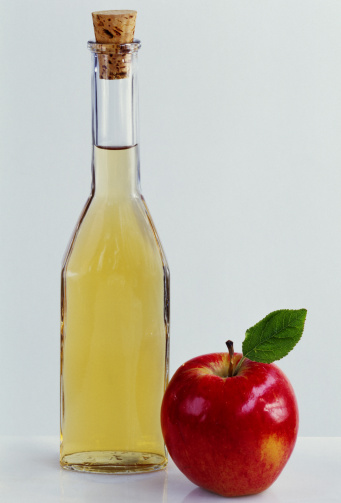
If you’re still only using apple cider vinegar in your salad dressings, you’re missing out. As odd as it might sound, the all-natural, all-purpose kitchen staple is also becoming a preferred beauty potion. As someone who can’t even cut an onion, putting something as pungent as a vinegar on my skin and hair was not easy the first time. But the transformative beauty benefits of ACV kept me coming back until I finally just moved the bottle from my kitchen cabinet to my medicine cabinet.
Note: If you want to try any of these tricks at home, be sure to only use a raw, organic, unfiltered, and unpasteurized apple cider vinegar (we like Bragg’s). And run it by your dermatologist, too.
As a Face Toner
I used regular toners for a few years, but I can’t say I ever really saw a big difference. Enter ACV, and my skin is brighter and tighter. “Skin is naturally acidic but when vinegar is used as a toner, it helps skin find the ideal balance between dry and oily,” says Dr. Karen Hammerman, cosmetic dermatologist at Vanguard Dermatology in New York City. I dilute a tablespoon of ACV with a few drops of water and apply with a cotton ball three to four times a week. If you have extremely sensitive skin, try adding more water to the mixture and use less frequently.
As a Hair Rinse
Ever notice how your shampoo seems to stop working after a few weeks, leaving you to assume that you need to buy a new brand? That could be the result of product buildup. It’s easy to forget that our scalp is skin and, just like our faces, needs a good deep cleaning every once in awhile. “Apple cider vinegar contains acetic acid which, when applied to your scalp, removes excess buildup left from styling products and shampoos,” says Hammerman. Twice a month, after shampooing, I pour one to two cups of the vinegar on my hair; I massage it into my scalp and let it sit for a few minutes before rinsing. Don’t worry, the smell won’t stick around—but if you’d prefer, try a clarifying shampoo like Fekkai’s Apple Cider Shampoo ($20, fekkai.com) for similar effects.
To Soothe Burns
If the thought of rubbing highly acidic vinegar on red-hot, tender skin makes you wince, you’re not alone. My face still scrunches right before I apply ACV to a sunburn, but, fear not because it doesn’t actually hurt. Amino acids in ACV “can help balance hydration in the skin and calm irritation,” says Hammerman. Massage onto sunburns or razor burns to turn down the heat.
To Clean Makeup Brushes
ACV can de-gunk every tool in your application arsenal, from blush brushes to brow brushes. And the malic acid in ACV makes it antibacterial, says Hammerman—so, you’re washing out germ buildup, too. Hammerman suggests combining one cup of warm water with one teaspoon of apple cider vinegar, and one or two thick slices of lemon to scent the concoction. Clean brushes with the mixture, rinse with water, and lay out to dry.
This article originally appeared on InStyle.com.
More from InStyle.com:
More Must-Reads from TIME
- Why Trump’s Message Worked on Latino Men
- What Trump’s Win Could Mean for Housing
- The 100 Must-Read Books of 2024
- Sleep Doctors Share the 1 Tip That’s Changed Their Lives
- Column: Let’s Bring Back Romance
- What It’s Like to Have Long COVID As a Kid
- FX’s Say Nothing Is the Must-Watch Political Thriller of 2024
- Merle Bombardieri Is Helping People Make the Baby Decision
Contact us at letters@time.com